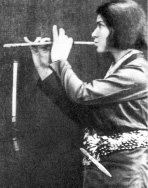|
“The greatest lyric poet of modern Germany,” as Karl Kraus called her, Else Lasker-Schüler, who was Jewish, wrote often on Hebraic themes. Her well-known book Hebrew Ballads (1913) treated numerous scriptural figures, usually in romantic or expressionist fashion, and as one writer put it, “Her biblical work combined a sense of the wild and primitive with the gentle and pure.” Shortly after Lasker-Schüler was awarded the prestigious Kleist Prize for literature in 1932, Hitler came to power; when the poet was beaten on a Berlin street by a gang of Nazi thugs, she fled for her life to Switzerland. Several years later, she traveled from Zurich to Genoa to Alexandria and arrived for the first time in Palestine. She stayed for two months. Immediately after her return to Europe she decided to write a prose book based on her impressions from this visit-and the result was Land of the Hebrews, the principal literary work from her late period. The tension between her exile in Zurich and her longings for Jerusalem infuse this book of place. In often startling fashion, Lasker-Schüler brings her singular sensibility to bear on the multi-layered nature of the land of Israel and Jerusalem at its heart. Her vivid, sometimes highly eccentric descriptions of that city’s history, landscape, religions, cultures, and people make Land of the Hebrews a major contribution to the literature of the region. Its fantastical prose notwithstanding, the book is grounded in the reality of the Palestine that the writer encountered at that historically charged moment. Lasker-Schüler would eventually return to Jerusalem for good. The poet Yehuda Amichai remembers her from this later period and calls her “the first hippie I ever saw.” Translated by Michael Hulse, the acclaimed translator of, among many others, the late W.G. Sebald (The Emigrants), the book also contains an afterword and notes by Itta Shedletzky, one of the editors of the German critical edition of Lasker-Schüler’s complete works and an authority on the writer. The volume also includes several of Lasker-Schüler’s own drawings from the original Swiss edition. “Psalmist of the German avant-garde.” Walter Mehring “She would walk about the city of Jerusalem like the spirit of poetry walking the street.” Leah Goldberg “Her huge animated raven-black eyes always had an elusive, mysterious look…. it was impossible to go anywhere with her without everyone stopping to stare…. [She] was the Prince of Thebes, Jussuf, Tino of Baghdad, the Black Swan.” Gottfried Benn ELSE LASKER-SCHÜLER was born in 1869 in Germany. Fleeing Nazi oppression, she left Germany for Jerusalem in 1939. She died in Jerusalem in 1945. MICHAEL HULSE was born in Staffordshire in 1955 and received his MA in German from St. Andrews University. His books of poetry include Eating Strawberries in the Necropolis and Empires and Holy Lands: Poems 1976-2000. Hulse has translated more than fifty books from German, including Goethe’s Sorrows of Young Werther, Jakob Wassermann’s Caspar Hauser, and Elfriede Jelinek’sLust. He lived in Germany for many years and currently teaches at the University of Warwick. ITTA SHEDLETZKY is the coeditor of the German critical edition of Else Lasker-Schüler’s works and letters. She has also edited the four-volume correspondence of Gershom Scholem. She has taught at the Hebrew University, Humboldt University (Germany), and the University of Giessen. She lives in Jerusalem. Publication indefinitely postponed. |

